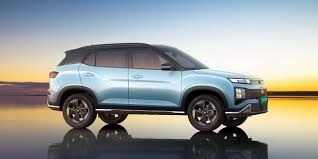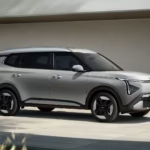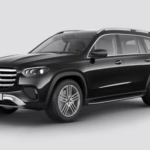Introduction
Hyundai, India’s most reliable carmaker, is now entering electric SUV territory with a name that all Indian families already recognize—Creta. With the upcoming Hyundai Creta EV, the company wants to electrify its top-selling mid-size SUV and bring EV technology to the mass market.
This piece goes in-depth into what you can expect from the Hyundai Creta EV in terms of price, specs, battery, and range, particularly for Indian roads, charging networks, and market expectations.
You are a city-centric SUV buyer, a family with a need for tech, or someone who wants to switch from petrol to electric without giving up on comfort and reliability. In that case, this Hyundai Creta EV teaser is for you.

Overview of Hyundai Creta EV (Expected 2025 Model)
The Hyundai Creta EV is expected to be available in early 2025, with test mules already spotted on Indian roads. Production is scheduled to begin at Hyundai’s Chennai facility by the end of 2024, making this one of the most anticipated EV launches in the country.
Hyundai’s technical specifications remain secretive. Initial rumors and insiders indicate that the Creta EV is likely to share the electric powertrain of the Hyundai Kona EV but with India-specific tuning and costs.
Hyundai would use the base body of the petrol/diesel Creta but incorporate subtle EV-exclusive features such as a shut grille, aero alloy wheels, reworked bumpers, and blue highlights to mark it as electric.
Key Highlights:
- Launch Timeline: Likely to be showcased in the Auto Expo 2025, release in the market by mid-2025.
- Powertrain: Expected to have a 100–120 kW motor (around 135–160 hp), with FWD configuration.
- Battery Pack: Projected 45–50 kWh lithium-ion battery, providing 350–450 km actual-world range.
- Platform: The ICE Creta platform was modified (not e-GMP) and reworked for the EV drivetrain.
- Design: Same silhouette as existing Hyundai Creta EV, with EV-specific visual tuning for aerodynamics and brand identity.
- Charging: Planned support for DC fast charging (up to 100 kW) and standard home AC charging.
The Hyundai Creta EV will balance familiarity and future-oriented tech, aiming to appeal to both first-time EV owners and current Creta owners who are upgrading with a sustainable mindset.
Performance & Driving Dynamics
The Hyundai Creta EV should provide a balanced performance package that is good for city mobility and has sufficient punch for frequent highway stints. It will not be a performance EV like the Ioniq 5, but it will provide more than enough zip for everyday commuting and family duties.
Performance Expectations:
- Top Speed: As high as 140–160 km/h, sufficient for Indian highways.
- Acceleration: 0–100 km/h in about 9–10 seconds, based on motor layout.
- Motor Output: Expected to come with a solitary electric motor that outputs 100–120 kW (135–160 hp), driven by front wheels (FWD).
- The EV motor’s instant torque will make the Creta EV respond faster off the block compared to its petrol equivalent, particularly in urban driving.
- Smooth acceleration and regenerative braking will add to the driving experience, particularly under stop-go urban conditions.
- The Hyundai Creta EV is expected to ride on a modified version of the ICE Creta platform rather than Hyundai’s dedicated e-GMP electric platform, which helps keep costs down.
- Hyundai is expected to make significant structural and thermal adjustments to accommodate the battery pack and maintain handling dynamics.
- The Hyundai Creta EV will not be the most hot-blooded performer, but it will provide smooth, hushed, and responsive dynamics that are perfect for India’s changing urban environment.
Battery & Range
The Hyundai Creta EV’s nucleus is its lithium-ion battery pack, which will supposedly provide efficiency and reliability to the Indian market. Although confirmed figures are to be announced, insiders indicate a 45—to 50 kWh battery, presumably the same configuration used in the Kona Electric.
Battery Specifications:
- Battery Capacity: 45–50 kWh
- Battery Type: Next-gen Li-ion cells with liquid cooling for best-in-class heat management in Indian conditions
- Thermal Management: Liquid cooling is built into the system to avoid overheating during hot temperatures and prolonged drives
Range Performance:
- ARAI Estimated Range: Expected to be 500–520 km (optimal conditions)
- City Driving: 380–420 km
- Highway Driving: 320–350 km
- Mixed Usage: 350–400 km
These figures will position the Hyundai Creta EV above competitors such as the Tata Nexon EV and near the MG ZS EV in real-life usage situations.
Charging Times:
- AC Home Charger (7.2 kW): 6 to 8 hours for complete charging
- DC Fast Charging (100 kW): 10–80% in about 40–45 minutes
Hyundai will make its home wall box charger standard and public DC fast-charging network access available. The EV will also come equipped with adaptive regen modes to prolong the usable range further, depending on driving habits.
The Hyundai Creta EV promises a hassle-free day-to-day range, supported by fast charging for efficient quick top-ups — an important determinant for EV adoption in India.
Pricing & Variants
The Hyundai Creta EV will be a premium city electric SUV between the Tata Nexon EV and MG ZS EV in terms of price and features. Although Hyundai has not revealed the official prices, projected estimates are for an ex-showroom price of Rs. 18.5—Rs. 22.5 lakh, depending on variant and battery type.
Expected Pricing (Ex-Showroom):
- Base Variant: Rs. 18.5–19 lakh
- Mid Variant: Rs. 20–21 lakh
- Top Variant: Rs. 22–22.5 lakh
- State incentives under FAME-II and state EV policies (such as Delhi, Maharashtra, Telangana) can lower on-road prices by Rs. 1–2 lakh in some states.
Variant Lineup:
- Hyundai will likely adopt its ICE Creta lineup with 3–4 trims:
- Base (EX) – Basic features, lower infotainment, standard battery
- Mid (S/SX) – Higher touchscreen, connected tech, alloy wheels
- Top (SX(O)) – Complete ADAS, sunroof, leatherette upholstery, higher battery pack
Price Comparison with Rivals:
| Model | Ex-Showroom Price | Range (Real-World) |
| Hyundai Creta EV (est.) | Rs. 18.5–22.5 L | 350–420 km |
| Tata Nexon EV LR | Rs. 16.99–19.99 L | 280–320 km |
| MG ZS EV | Rs. 18.98–24.98 L | 350–400 km |
| Mahindra XUV400 | Rs. 15.49–17.49 L | 280–310 km |
Features & Technology
The Hyundai Creta EV will be feature-loaded and technology-oriented, building upon the legacy of the ICE Creta while adding EV-specific improvements. Hyundai will provide a connected, secure, and futuristic driving experience customized for the new-age Indian consumer.
Infotainment & Connectivity:
- Infotainment System: Presumably a 10.25-inch touchscreen with refreshed EV-specific UI
- Digital Instrument Cluster: Digital display with real-time range, regen level, charging status, and driving modes
- Connected Car Technology: Upgraded Hyundai Bluelink package with remote battery check, charging control, geo-fencing, and OTA updates
- Voice Commands & AI Assistant on the cards, like the present flagship Creta
Safety & ADAS:
- ADAS Level 2 (Tentative in SX(O) variant):
- Forward Collision Warning
- Lane Keep Assist
- Adaptive Cruise Control
- Blind Spot Monitoring
Standard Safety:
- 6 Airbags
- ABS with EBD
- ESC, Hill Hold Control, TPMS, and Rear Parking Camera
- Electronic Parking Brake with Auto Hold (top trims)
Exclusive EV Features:
- Regenerative Braking Modes: Several levels of regen for tailored energy recuperation
- Vehicle-to-Load (V2L) Capability: Available on top trims — enables charging laptops, appliances, or other devices from the car battery
- Drive Modes: Eco, Normal, Sport + Regen mode for optimal driving
- Eco A/C and Battery Saver Modes for maximum range in hot weather
- Sound Design: Electronic drive sounds and adjustable EV sound themes (optional)
The Hyundai Creta EV is designed not just to replace the ICE experience, but to elevate it, blending Hyundai’s signature comfort with the tech benefits of electric mobility.
Pros and Cons
- Trusted Creta Brand Value: Built on the success of one of India’s best-selling SUVs, offering familiarity and confidence to buyers transitioning to electric.
- Well-Rounded Urban SUV: This SUV combines the space, comfort, and features of a mid-size SUV with the smooth, silent practicality of an EV—perfect for city life.
- Hyundai’s Service & Charging Network: Access to Hyundai’s vast dealership network, roadside assistance, and growing EV charging infrastructure across major cities.
- Premium Pricing vs ICE Creta: Likely to cost Rs. 4–5 lakh more than the petrol/diesel Creta, which may deter budget-conscious buyers.
- Limited Range for Long Highway Travel: Although good enough for everyday commuting, real-world range could still be inadequate for frequent city-to-city travelers.
- Uncertain Long-Term Battery Durability: Indian climate, traffic, and charging patterns may affect battery longevity; long-term durability evidence is still unfolding.
The Hyundai Creta EV is an urban SUV ready for the future, but prospective buyers need to consider their everyday usage, budget, and EV-readiness before making the transition.
Hyundai Creta EV vs Rivals (2025)
Hyundai is entering one of the most contested segments of India’s EV market with the rollout of its Creta EV, a mid-size electric SUV. It will compete with veteran and soon-to-launch competitors such as the Tata Nexon EV, MG ZS EV, and Maruti Suzuki eVX.
| Model | Ex-Showroom Price (Rs. ) | Battery Capacity | Range (Real-World) | Motor Output | DC Fast Charging | Key Features |
| Hyundai Creta EV (Expected) | Rs. 18.5–22.5 lakh | 45–50 kWh (Li-ion) | 350–420 km | ~135–160 hp | Up to 100 kW (est.) | ADAS L2, Bluelink, V2L, Regen modes |
| Tata Nexon EV LR | Rs. 16.99–19.99 lakh | 40.5 kWh | 280–320 km | 143 hp | 50 kW | Arcade. EV app suite, ventilated seats |
| MG ZS EV | Rs. 18.98–24.98 lakh | 50.3 kWh | 350–400 km | 174 hp | 50 kW | Panoramic sunroof, ADAS, iSmart app |
| Maruti Suzuki eVX (Upcoming) | Rs. 18–22 lakh (est.) | 48–60 kWh (est.) | 400–450 km (est.) | ~130–150 hp (est.) | 80–100 kW (est.) | 12″ infotainment, ADAS, EV platform |
- The Hyundai Creta EV is expected to find a middle ground between the MG ZS EV and Nexon EV in terms of price, range, and features.
- It could beat the Nexon EV in technology and range, but is priced lower than the MG ZS EV, which has a more established brand value.
- Maruti eVX will be its strongest competitor if it is launched at an aggressive price, but its launch could come after Hyundai’s introduction.
Who Should Buy the Hyundai Creta EV in 2025?
The Hyundai Creta EV is designed for one particular type of customer — someone who is willing to accept electric mobility without sacrificing the comfort, dependability, and upscale vibe of a mid-size SUV. Yet like any EV in India’s still-evolving ecosystem, it’s not one size fits all.
Best Suited For:
- Urban Professionals & City Dwellers: Those who drive 30–50 km a day and want low running costs, zero tailpipe emissions, and a smooth, silent commute.
- Families Upgrading from ICE SUVs: Existing Creta, Seltos, or Nexon owners looking to shift to electric without compromising on space, features, or road presence.
- Hyundai Loyalists: Buyers who value Hyundai’s after-sales service, quality assurance, and brand trust in long-term ownership.
- Tech Enthusiasts: Customers attracted to intelligent features, connected technology, ADAS, and digital instrument clusters.
Not Suitable For:
- Heavy Highway Users: If you travel extensively along highways and are dependent on roadside support, the Creta EV’s highway range and charging infrastructure might be inadequate.
- Rural & Semi-Urban Buyers: Few DC fast charging points and service stations in rural and semi-urban areas might pose long-term challenges to EV ownership beyond metropolises.
- Price-Sensitive Buyers: At an anticipated ex-showroom price above Rs. 18 lakh, budget buyers might do better with petrol/diesel Creta or Tata Nexon EV trims.
Final Verdict
The Hyundai Creta EV is set to become one of the top electric SUVs of 2025. It will combine the tried-and-tested popularity of the Creta name with the growing demand for clean, connected, and future-focused mobility.
Suppose you want an EV that provides tried-and-tested brand reliability, everyday usefulness, generous interiors, and a good blend of tech and safety options. In that case, the Creta EV must be near the top of your shopping list. It’s not only an electric car — it’s an electric Creta, and that in itself will have broad appeal to thousands of Indian buyers used to its comfort and road presence.
However, until official specs, prices, and variant details are out, it’s best to wait for Hyundai to release the complete picture. Once launched, drive the car, check local charging infrastructure, and compare EMI or lease options if you’re budget-conscious.
For the Indian urban SUV buyer looking to go electric, the Hyundai Creta EV might be the ideal way to transition into the world of EVs without giving up on what you love about your existing SUV.
FAQs
Q1. What is the anticipated range of the Hyundai Creta EV?
The Hyundai Creta EV’s range is up to 420 km under real-world driving conditions, depending on the driving mode and use cases. Under optimum testing conditions, the ARAI-approved range may exceed 500 km.
Q2. Will the Hyundai Creta EV feature fast charging?
Yes. The Hyundai Creta EV has a 100 KW DC fast charger, which will allow for a 10–80% charge in approximately 40–45 minutes. It will also feature AC home charging (7.2 kW), which might take 6–8 hours to charge fully.
Q3. How does it differ from the petrol/diesel Creta?
It will have the same overall design language and platform as the ICE Creta. The EV model will feature:
- A closed front grille for improved aerodynamics
- Blue accents, EV-specific alloy wheels, and refreshed bumpers
- A completely digital dashboard with information related to EVs
- An electric powertrain with regenerative braking and drive modes
Q4. Will the Hyundai Creta EV qualify for the FAME 2 subsidy?
The FAME 2 scheme is based on the latest battery specs and localization percentages. Suppose Hyundai is eligible (particularly battery capacity and local sourcing norms). In that case, the Creta EV may be able to claim state-level incentives, although central FAME 2 benefits are uncertain for cars over ₹15 lakh.
Q5. What kind of warranty will Hyundai provide on the EV battery?
Hyundai will likely include an 8-year or 160,000 km warranty as standard on the battery, similar to the process for the Kona Electric and industry practice for EVs in this category.




